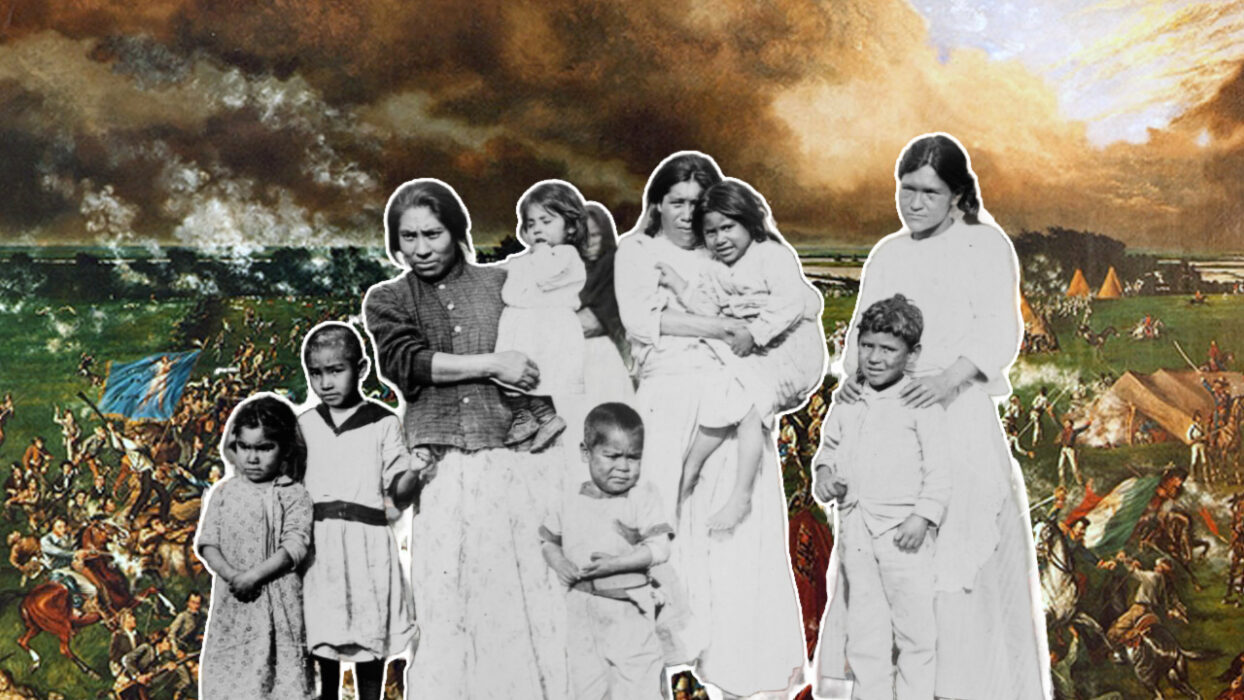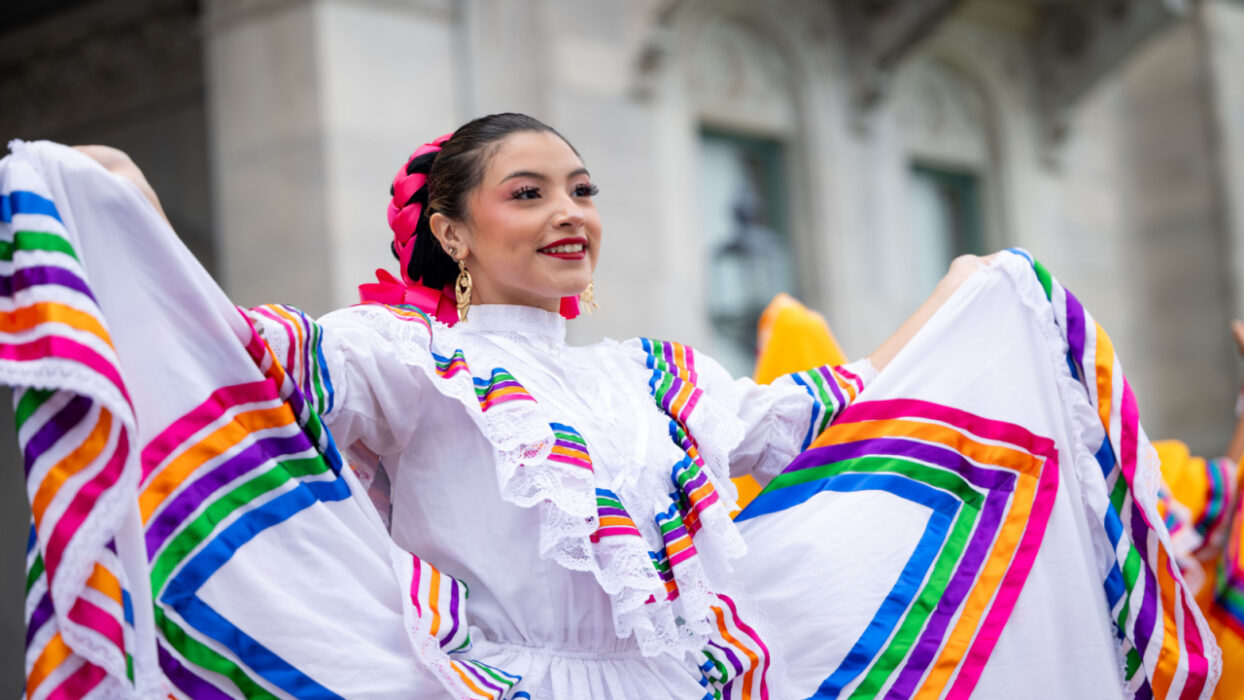
Yahritza Y Su Esencia Defend Their Spanish Skills, Relate to Immigrants Learning English Who Get ‘Made Fun Of’
Yakima, Washington sibling trio Yahritza y su Esencia sat down with interviewer Pepe Garza to shed light on their controversial statements in Mexico City. The band came under fire this month for saying they preferred Washington’s “spicier” food, and for lead singer Yahritza Martínez, 16, saying comments like, “I just don’t like Mexico.”
However, their recent interview with Garza shows how the backlash against their statements has affected their lives. At her family’s home, Yahritza explained that she felt scared to go out after reading threatening, hateful comments online.
“I didn’t even want to go out because of fear,” she said. “That if they saw me, they would do something to me.”
At one point in the interview, Garza gestures at how people on social media “bullied” Yahritza y su Esencia after their statements. “This message is about bullying. That we shouldn’t do it,” Garza explained. “This is for people to know that they are hurting people, this isn’t a joke, this isn’t to get ‘likes’ [on social media].”
Older brother Armando Martinez, 25, seemed to agree, defending himself against people who critique the band for not speaking perfect Spanish. As he put it, “It’s not okay, and it doesn’t feel good for people to make fun of you for how you speak, because we’re trying.”
Here’s what the band had to say about the backlash against them after their interview
Yahritza y su Esencia became quite the trending topic after a Mexican press tour gone wrong. While at Ciudad de México, the “Frágil” musical trio said they preferred Washington’s “spicier,” “better” food, talked about their love of chicken without any chile and seemed to scoff at soda in a plastic bag.
Even worse, another video surfaced of 16-year-old singer Yahritza Martínez saying, “I’m not saying I hate Mexico; I just don’t like Mexico.” In yet another clip, she clarified, “I don’t think it’s Mexico. I just feel like it’s Mexico City.” One interview shows her talking about CDMX’s many police sirens waking her up.
Here’s a compilation of the moments that left many fans scratching their heads:
Now, in their latest interview with Garza, the band explained their comments. All the while, the band broke bread with the interviewer, enjoying a meal of homemade tortillas, chile, carne asada and frijoles at home with their family. Their mother proudly prepared it, looking at all of them alongside their father and sister.
As the sister told Garza, they were all sitting in the house the band had just bought for their family.
At that point, the interviewer asked the siblings about those infamous comments. Brother Jairo Martinez, 18, who famously said those quips about “chicken,” replied: “I don’t know, I’m delicate with sauces and stuff. But I like Mexican food.”
Yahritza added, “We do eat Mexican food.”
Jairo also explained why he said the word “chicken” in the Spanish interview in Mexico City instead of “pollo.” He said, “I can say ‘pollo,’ but it was easier to say ‘chicken.'”
As older brother Armando put it, “It’s normal here to mix words in Spanglish. Because in school, you have to speak English, and then you come home, and you don’t speak enough Spanish to speak it well.”
The band also confronted accusations of them “not valuing” Mexican culture
In the interview, Armando, who was born in Jiquilpan, Michoacán, said the siblings weren’t lucky enough to often travel to Mexico.
“We haven’t had the luck to go to Jiquilpan, Michoacán, because we weren’t able to do it when we were kids,” he explained. “But we wanted to, and I think that affected us. Going to Mexico was new to us.”
By that, Armando seemed to be referencing their family’s mixed immigration status, which meant the family couldn’t travel to Mexico together. In fact, while Yahritza and Jairo were born in the United States, Armando was born in Mexico— and as per De Los, was undocumented for much of his life.
“I didn’t get to choose where I was born,” he told the outlet at the time. “I didn’t get the choice to immigrate to the U.S.”
“You can’t force anyone to like or do anything because of their race.”
In the interview with Garza, they took the time to clarify some of their controversial content while in Mexico City. For one, Yahritza was not disgusted by drinking soda from a plastic bag. In fact, as she explained, she asked for the soda in the bag to take it to-go in the car. The face she made was an inside joke between the siblings.
At that point, Yahritza also spoke about her thoughts on her own bicultural identity, namely in connection to this unearthed interview. In that video, she says, “Just because I sing in Spanish, the people that listen to me are in Mexico, it doesn’t matter if I speak more English in Spanish.”
“I’m going to speak in Spanish when I want to, I’m going to speak in English when I want to.”
Now, speaking to Garza, Yahritza stays firm on her beliefs. “We weren’t fighting, I speak Spanish everyday with my parents, but I feel more comfortable speaking in English because I grew up speaking in English.”
“It’s not because I don’t like speaking Spanish. I sing in Spanish, I grew up singing in Spanish.”
Yahritza spoke out about feeling “fear” to leave her house amid hateful comments
At one of the most crucial points in the interview, Yahritza admitted to feeling “fear” to leave her home amid the controversy.
“I was looking at videos of [my brother] and they were sending him death threats, and he’s my brother, you know?” she explained in tears. “They weren’t joking around anymore. It was like, ‘If you go to Mexico, and I see you…'”
“I didn’t even want to go out because of fear,” she said. “That if they saw me, they would do something to me.”
“The last thing I want to happen is for something to happen to my [brother],” she added. “It was more about being worried for him.”
The singer also pushed back on claims their parents “didn’t raise them right.”
“We grew up eating Mexican food, we were very poor,” she described. “My parents fought to buy us shoes, food, sometimes we couldn’t even buy beans.”
“People say we don’t support the country and all of that, but we didn’t grow up there. We don’t know that much about Mexico.”
At that point, Armando spoke out about the fact they don’t speak “perfect” Spanish. In that moment, he seemed to relate their struggles speaking Spanish to others who find difficulties learning English.
“They say that we’re Mexican and we don’t speak Spanish well, but Mexicans who move to the United States… I also had friends at school who didn’t know how to speak [English] well.”
“They made fun of them, and I would defend them,” he recalled, saying, “Hey, don’t be making fun of them, he just got here from Mexico, it’s not his fault.”
“A lot of Mexicans who go to school here, they can understand, too,” he explained. “It’s not okay, and it doesn’t feel good for people to make fun of you for how you speak, because we’re trying.”




